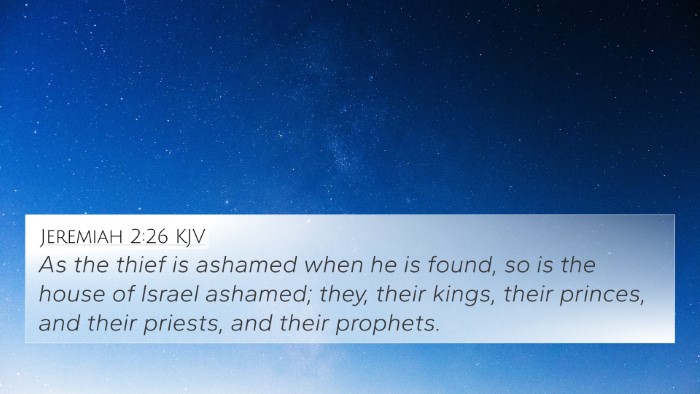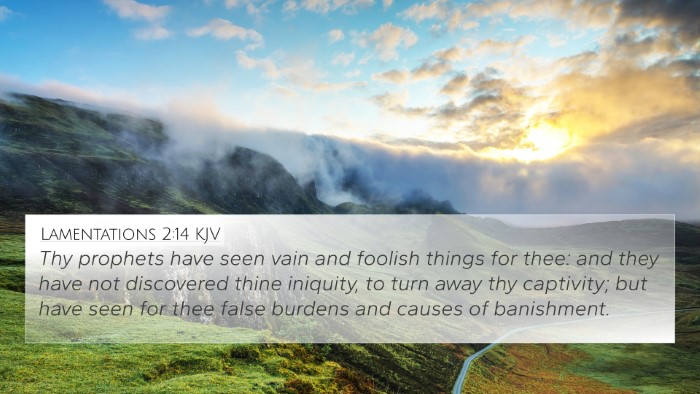Old Testament
Genesis Exodus Leviticus Numbers Deuteronomy Joshua Judges Ruth 1 Samuel 2 Samuel 1 Kings 2 Kings 1 Chronicles 2 Chronicles Ezra Nehemiah Esther Job Psalms Proverbs Ecclesiastes Song of Solomon Isaiah Jeremiah Lamentations Ezekiel Daniel Hosea Joel Amos Obadiah Jonah Micah Nahum Habakkuk Zephaniah Haggai Zechariah MalachiZechariah 11:15 Similar Verses
Zechariah 11:15 Cross References
And the LORD said unto me, Take unto thee yet the instruments of a foolish shepherd.
Uncover the Rich Themes and Topics of This Bible Verse
Listed below are the Bible themes associated with Zechariah 11:15. We invite you to explore each theme to gain deeper insights into the Scriptures.
Zechariah 11:15 Cross Reference Verses
This section features a detailed cross-reference designed to enrich your understanding of the Scriptures. Below, you will find carefully selected verses that echo the themes and teachings related to Zechariah 11:15 KJV. Click on any image to explore detailed analyses of related Bible verses and uncover deeper theological insights.

Isaiah 6:10 (KJV) »
Make the heart of this people fat, and make their ears heavy, and shut their eyes; lest they see with their eyes, and hear with their ears, and understand with their heart, and convert, and be healed.

Jeremiah 2:26 (KJV) »
As the thief is ashamed when he is found, so is the house of Israel ashamed; they, their kings, their princes, and their priests, and their prophets.

Lamentations 2:14 (KJV) »
Thy prophets have seen vain and foolish things for thee: and they have not discovered thine iniquity, to turn away thy captivity; but have seen for thee false burdens and causes of banishment.

Ezekiel 13:3 (KJV) »
Thus saith the Lord GOD; Woe unto the foolish prophets, that follow their own spirit, and have seen nothing!

Matthew 23:17 (KJV) »
Ye fools and blind: for whether is greater, the gold, or the temple that sanctifieth the gold?

Matthew 15:14 (KJV) »
Let them alone: they be blind leaders of the blind. And if the blind lead the blind, both shall fall into the ditch.

Luke 11:40 (KJV) »
Ye fools, did not he that made that which is without make that which is within also?
Zechariah 11:15 Verse Analysis and Similar Verses
Understanding Zechariah 11:15
In Zechariah 11:15, the prophet receives instruction from God regarding the act of gathering the foolish sheep, which can be interpreted as a reflection on leadership and the role of shepherds among God's people. This passage contains profound implications for both contemporary believers and the historical context of Israel.
Verse Context and Summary
This verse states: "And the LORD said unto me, Take unto thee the instruments of a foolish shepherd." This instruction signifies a shift towards warning against incompetent leaders who lack genuine care for those they lead.
Commentary Insights
- Matthew Henry:
Henry elaborates on the symbolism of the 'foolish shepherd,' suggesting they embody those who neglect their duties and fail to guide their flock wisely. He connects this notion to the prevailing leadership of Israel at the time, emphasizing the disastrous outcomes of such negligence.
- Albert Barnes:
Barnes offers a more theological interpretation, arguing that such shepherds signify false prophets or leaders who mislead through their foolishness. He stresses the importance of discernment among the people of God to avoid falling prey to such misleading figures.
- Adam Clarke:
Clarke focuses on the eschatological implications of this verse, linking it to the final days when God's judgment will be evident upon those who have led His people astray. He emphasizes that the 'foolish shepherd' serves as a warning for all leaders to be vigilant and wise.
Thematic Connections
This passage can be seen in relation to various themes found throughout Scripture, particularly concerning leadership, accountability, and divine judgment. Key themes include:
- God's Sovereignty in appointing shepherds
- The responsibility of leaders toward their followers
- Warnings against blind following without discernment
- Judgment upon those who mislead
Cross-references for Zechariah 11:15
Several Bible verses relate to the themes found in Zechariah 11:15. These cross-references enhance our understanding of the text and can be valuable tools for deeper study:
- Jeremiah 23:1-4: A warning against the shepherds who destroy and scatter God's flock.
- Ezekiel 34:2-10: Criticism of Israel's leaders and a promise from God to shepherd His people Himself.
- John 10:12-14: Jesus contrasts the good shepherd, who lays down his life for the sheep, with the hired hand who abandons them.
- Matthew 7:15: Jesus warns about false prophets and their deceptive nature.
- 1 Peter 5:2-3: Instructions to shepherds to take care of their flock willingly and humbly.
- Hebrews 13:17: A reminder of the accountability of leaders in the church.
- Matthew 25:31-46: The parable of the sheep and the goats highlights the fate of those who fail to care for others.
- Micah 3:1-4: A condemnation of the leaders for their failures to act justly.
- Isaiah 56:11: Describes the leaders as greedy and blind, paralleling the idea of a foolish shepherd.
- Romans 12:6-8: Encouragement to exercise leadership wisely and with diligence.
Conclusion
Zechariah 11:15 serves as a critical reminder of the importance of wise leadership and the perils of folly among those who are meant to guide their communities. Understanding this verse through the lens of public domain commentaries enriches its meaning and application in our lives today.
Further Study
As you continue your journey through Scripture, consider using tools for Bible cross-referencing to deepen your understanding of the connections between different passages. Resources such as a Bible concordance or a cross-reference Bible study guide can facilitate your exploration of thematic Bible verse connections and the comprehensive study of Biblical texts.
Additional Resources
- Utilize a Bible concordance to find related verses easily.
- Engage in a cross-reference Bible study to uncover deeper thematic ties.
- Explore the complexities of inter-Biblical dialogue through comparative Bible verse analysis.
- Look for cross-referenced themes that connect various scriptures for a holistic understanding.


